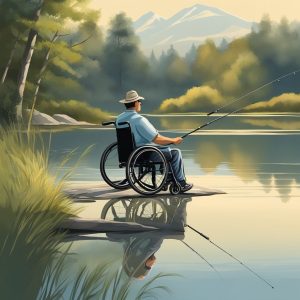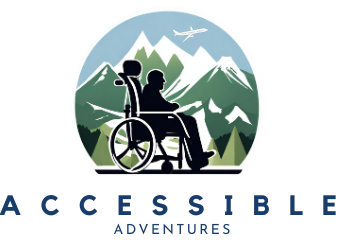Wheelchair Fishing: Tips and Techniques for a Successful Trip

If you’re an angler who uses a wheelchair, you might be wondering if you can still enjoy fishing. The answer is yes!
Wheelchair fishing is a popular activity that allows people with disabilities to experience the joy of fishing. With some preparation and the right equipment, you can cast your line and reel in a big catch just like any other angler.
Understanding Wheelchair Fishing
Wheelchair fishing involves adapting traditional fishing techniques and equipment to meet the needs of people with disabilities.
This can include using specialized fishing rods, reels, and other gear that are designed to be used with one hand or to require less physical strength. Some anglers also use adaptive fishing boats that are equipped with wheelchair ramps and other accessibility features.
Equipment and Gear for Wheelchair Anglers
There are many different types of equipment and gear that can make wheelchair fishing easier and more enjoyable.
These can include fishing rod holders that attach to your wheelchair, adaptive fishing reels that can be operated with one hand, and fishing line guides that help you cast your line more accurately.
You may also want to invest in a comfortable fishing chair or cushion to help you stay comfortable during long fishing trips.
Key Takeaways
- Wheelchair fishing is a popular activity that allows people with disabilities to experience the joy of fishing.
- Adapting traditional fishing techniques and equipment to meet the needs of people with disabilities is key to successful wheelchair fishing.
- Investing in specialized fishing gear and equipment can make wheelchair fishing easier and more enjoyable.
Understanding Wheelchair Fishing
Fishing is a popular outdoor activity enjoyed by millions of people worldwide. It is a great way to relax and unwind, and it can also be a fun and rewarding hobby.
For individuals with disabilities or limited mobility, fishing can be a great way to enjoy the outdoors and experience the thrill of catching fish.
Wheelchair fishing is a popular form of fishing that allows individuals with disabilities to enjoy the sport.
Benefits of Fishing for Individuals with Disabilities
Fishing has many benefits for individuals with disabilities. It can be a great way to reduce stress, improve mood, and increase physical activity.
Fishing can also help to improve hand-eye coordination and promote social interaction. Additionally, fishing can provide a sense of accomplishment and boost self-esteem.
The Importance of ADA Compliance in Fishing Locations
The Americans with Disabilities Act (ADA) requires that all fishing locations be accessible to individuals with disabilities.
This means that fishing locations must have accessible routes, ramps, gangways, and slopes to ensure that individuals with disabilities can safely and easily access the fishing area. Handrail extensions must also be provided to ensure that individuals with disabilities can safely navigate the fishing location.
It is important to note that not all fishing locations are ADA compliant. Before planning a fishing trip, make sure to research the fishing location to ensure that it is accessible to individuals with disabilities.
Many state and local communities have stepped up to help make fishing much easier with much better access to ramps for wheelchairs, specially groomed trails, and larger fishing platforms. The fishing manufacturers have also developed new aids and specialized equipment to help disabled anglers.
Equipment and Gear for Wheelchair Anglers
Fishing is a great recreational activity that can be enjoyed by everyone, including those who use wheelchairs. With the right equipment and gear, wheelchair anglers can have a fun and successful fishing experience. Here are some things to consider when choosing equipment and gear for wheelchair fishing:
Adaptive Fishing Equipment
Adaptive fishing equipment is designed to assist anglers with disabilities.
There are a variety of adaptive fishing equipment available, such as the Rexfly Casting System, which is a hands-free fly fishing system that can be operated with one hand.
The Be Adaptive Equipment Strong Arm Rod Holder is another great option that allows anglers to easily cast and reel in their catch with one hand.
Choosing the Right Fishing Rod and Reel
When selecting a fishing rod and reel, make sure to consider the angler’s strength and mobility.
A lightweight rod and reel may be easier for some wheelchair anglers to handle, while others may prefer a heavier setup for bigger catches.
Additionally, electric fishing reels and reel cranks can be used to make reeling in a catch easier.
Modifications and Gadgets for Enhanced Accessibility
There are various modifications and gadgets available to enhance accessibility for wheelchair anglers.
For example, Elec-Tra-Mate offers a motorized fishing reel that can be operated with the push of a button. The Fishing Caddy is another gadget that can be used to hold fishing tackle and accessories, making it easier for wheelchair anglers to access their gear.
In addition to equipment and gear, make sure to have the right bait and hooks for the type of fish you’re targeting.
For example, if you’re fishing for bass, you may want to use soft plastic lures or spinnerbaits. And if you’re fishing in saltwater, you’ll need hooks that are resistant to corrosion.
Accessible Fishing Locations
If you are a disabled angler, finding wheelchair accessible fishing spots can be challenging. However, with a little research, you can find many accessible fishing locations that provide access to recreation for all.
Finding Wheelchair Accessible Fishing Spots
Fishing has no boundaries, and there are many organizations that promote handicapped fishing.
For example, Fishing Has No Boundaries is a non-profit organization that provides opportunities for people with disabilities to experience the joys of fishing. They offer events across the country, including in Fort Myers, Florida.
To find accessible fishing locations near you, you can use Google Maps. Simply turn on the “Accessible Places” feature to have wheelchair accessibility information, such as fishing locations.
You can also do some Google searching to find more information. For example, the Oregon Department of Fish & Wildlife has a disabled angler access map that highlights 133 sites across Oregon that may be suitable for anglers with physical disabilities.
Features of Accessible Fishing Piers and Ramps
Accessible fishing piers and ramps have features that make them easier to use for people with disabilities. Here are some of the features you can expect to find:
- Accessible routes: Accessible fishing piers and ramps have routes that are wide enough to accommodate wheelchairs and have a slope that is no steeper than 1:12.
- Ramp: The ramp should be at least 36 inches wide with handrail extensions that are at least 12 inches long beyond the top and bottom of the ramp.
- Gangways: Gangways should be at least 36 inches wide and have handrail extensions that are at least 12 inches long beyond the top and bottom of the gangway.
- Handrail extensions: Handrail extensions should be at least 12 inches long beyond the top and bottom of the ramp or gangway.
- Fishing piers: Fishing piers should have benches and alternating high and low handrails with bait shelves that can accommodate anglers in wheelchairs.
Safety and Preparation
Fishing can be a fun and rewarding recreational activity for wheelchair users, but it is important to take the necessary safety measures and prepare adequately before heading out. Here are some tips to ensure a safe and enjoyable fishing experience.
Pre-Trip Checklist for Disabled Anglers
Before embarking on a fishing trip, make a pre-trip checklist to ensure that you have all the necessary equipment and supplies. Here are some items to include on your checklist:
- Bait and lures: Depending on the type of fish you are targeting, you may need live bait, artificial lures, or both. Make sure to bring enough to last for the duration of your trip.
- Fishing rod and reel: Choose a rod and reel that are appropriate for the type of fish you are targeting and your fishing abilities. Consider using a rod holder to make it easier to cast and reel in your catch.
- Life jacket: Even if you are a strong swimmer, it is important to wear a life jacket while fishing. Accidents can happen, and a life jacket can help keep you afloat in case you fall into the water.
- Sunscreen and hat: Protect your skin from the sun’s harmful rays by wearing sunscreen and a hat.
Safety Measures and Emergency Protocols
Once you have all the necessary equipment and supplies, make sure to take the necessary safety measures and be prepared for emergencies. Here are some tips:
- Choose a safe location: When choosing a fishing location, look for a spot that is safe and accessible for wheelchair users. Avoid areas with strong currents or rough waters.
- Check the weather: Check the weather forecast before heading out and avoid fishing during inclement weather.
- Inform someone of your plans: Before heading out, inform someone of your fishing plans, including where you will be fishing and when you expect to return.
- Have an emergency plan: In case of an emergency, make sure to have a plan in place. Make sure you have a phone or other means of communication, and know the location of the nearest hospital or emergency services.
Frequently Asked Questions
How can I modify my fishing gear for use from a wheelchair?
Fishing gear can be modified to accommodate wheelchair users. You can add rod holders, fishing line holders, and other accessories to your wheelchair.
You can also purchase specialized fishing gear designed for wheelchair users. Look for gear that is lightweight, easy to use, and can be operated with one hand.
What are the best locations for wheelchair-accessible fishing?
There are many locations that offer wheelchair-accessible fishing. Look for fishing piers, docks, and platforms that are designed for wheelchair users.
Many state parks and wildlife areas also offer wheelchair-accessible fishing areas. Check with your local fishing and wildlife agency for more information.
Are there specific fishing charters that accommodate wheelchair users?
Yes, there are fishing charters that are designed for wheelchair users. Look for charters that offer wheelchair-accessible boats and equipment.
You can also ask the charter company if they have experience working with wheelchair users.
What tips can you provide for someone fishing from a wheelchair for the first time?
If you are fishing from a wheelchair for the first time, it’s important to take your time and be patient.
Make sure your wheelchair is stable and secure before you begin fishing. Use lightweight gear that is easy to maneuver.
You can also ask a friend or family member to assist you if needed.
How can I find wheelchair-accessible fishing charters in Florida?
Florida has many fishing charters that are designed for wheelchair users. Look for charters that offer wheelchair-accessible boats and equipment.
You can also check with your local fishing and wildlife agency for more information.
What equipment is essential for a disabled person to enjoy fly fishing?
Fly fishing can be enjoyed by disabled persons with the right equipment.
Look for fly fishing rods that are lightweight and easy to maneuver.
You can also purchase specialized fly fishing equipment designed for disabled persons, such as hand-operated reels and line holders.
